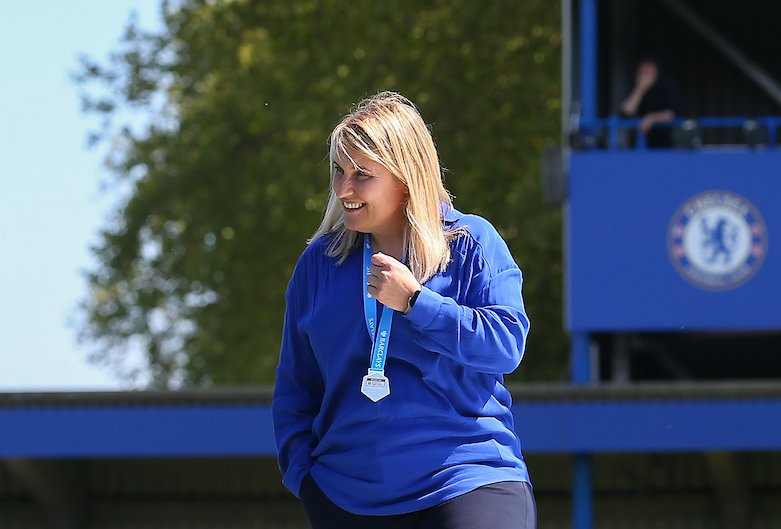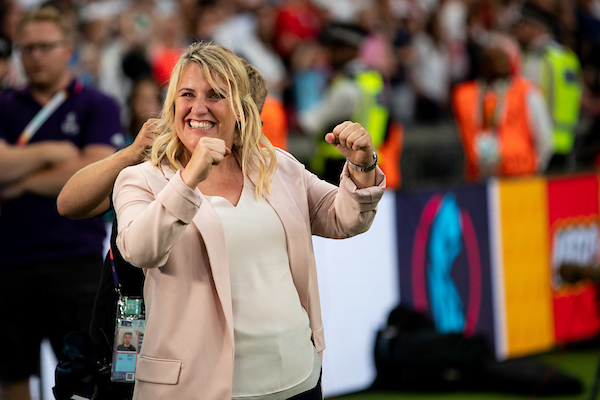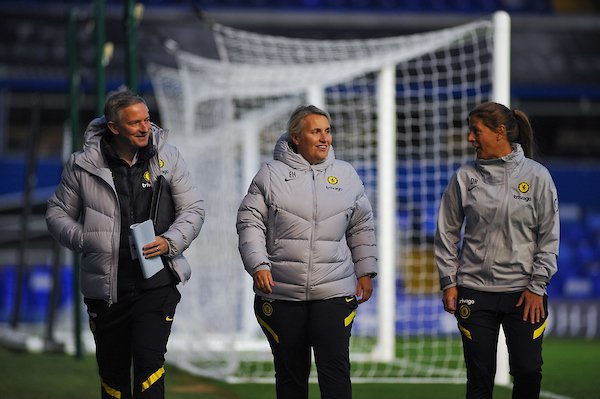
Time flies when you’re having fun and Emma Hayes OBE certainly enjoys being the boss of champions Chelsea. Yesterday marked a decade at the Blues for Hayes, but as the Barclays WSL’s longest serving and most successful manager reached an impressive landmark of service to the club, and as a spokesperson for the wider women’s game, she is also preparing for the toughest and most exciting campaign yet. And they will kick this one off against West Ham at Stamford Bridge (12.30pm ko, 11th September – Ticket info HERE).
The 2021 FIFA Women’s Best Coach (and first coach to be inducted into the BWSL’s Hall of Fame), Hayes chatted to the media about the impact of the EUROs, past struggles, and current and future challenges for her team and the women’s game, ahead of her anniversary. Here’s some of what she had to say…
On their league opener at Stamford Bridge:
What a great way to start the season, Stamford Bridge and being able to welcome home all of the players from the EUROs, particularly the winners. It’s an opportunity to showcase the talent. This is what you want. We’ve got the best product in our league and now is the time to sell it properly with the right support around it. It’s a great way to kick off the season.
On her feelings at the final whistle of the EUROs, and what it could do for the game:
Unbelievable emotion at the end of the game; probably pride in the fact that the team had finally fulfilled its potential. It took an experienced leader to help the team over the line, and Sarina Wiegman did an amazing job with that, and just pride at being a part of women’s football in this country. I know that a lot of people have put a lot of time into growing the game to where it is, so to experience that at the home of football was an incredible experience for everyone involved. Magic. Magic night.

On BWSL games taking place not just at Stamford Bridge but Anfield, The Emirates etc. and the importance of taking the momentum into the domestic game:
One thing we’ve started to do better in the last couple of seasons is scheduling. Some of that is start times, to make sure that players have a bit more recovery; we’re not starting before the international break, which I know was on the table. Ideally, we kick off with big, blockbuster games to kick on with the momentum of the summer; some of us are doing that, which I think is critical. It’s important we try to establish these big stadium events as regular things, rather than just once a year, ideally move towards a six or eight-game situation, and then I still think there is work to be done. I don’t think it’s as straightforward as just leaving our grounds and going into the men’s stadiums, I’m too strategic to think about it like that. I think we have to see realistically where that growth will be again this year, but I do think this will be the year that clubs will start to prepare for the next step in our growth, for two years’ time etc.
[It’s a] great start. Let’s hope we get solid numbers, I’m sure we will. I don’t know if they’ll all be sell-outs but I think they’ll be much more solid numbers than they were 12 months ago, and they won’t be giveaways, and that, for me, is the big difference, they’ll be paid-for tickets.
I think it’s a tipping point of the last 10-12 years, of that period with the foundation being put in place, the professional league, full-time coaches at all the age groups at England. Our sport has only been professional for maybe two seasons, maybe not even that – it’s the end of that era.
That win, if it didn’t open the eyes of the Premier League, it will do now. You know I’m a big advocate of that, because if 86,000 people are paying for tickets for that and it could have sold out two or three times over, the appetite is there, and I’ve always been an advocate of the women’s game becoming a business. I think we’ve now entered that phase, of women’s football becoming a business.
On her memories of her first days/weeks at Chelsea:
My overwhelming [memory] is getting off a train at Cobham, from Waterloo, walking in a gate that let me get straight onto the training ground – I thought that was really odd – and then walking down the path all the way down to this building that I’d been to once before when I was the academy director and coach at Arsenal and had brought my academy team here. I remember looking at it and thought, ‘Oh my goodness, what potential.’ I was on my own – we’re talking about 10am on Sunday morning, no one on site – and then the realisation of ‘what do you mean we don’t have an office?’ What do you mean there’s no full-time players or staff?’ There wasn’t a single member of staff that worked for the women’s section, let alone had an office, let alone had a desk or a filing cabinet. The starting point was zero, and that was both terrifying and exciting all at once. I think they are my overriding memories, and then watching the team play and thinking, ‘Oh my God, this is a million miles from what I’ve just come from.’ The gulf was so big, coming from WPS [Women’s Professional Soccer, in the United States] to here, that I was like ‘I don’t know if I can go backwards.’ It felt like I was going backwards. I only had five games, I coached the team for five games and I didn’t know whether I was going to do it, because I thought ‘this is pretty low level.’
On having support from people internally at Chelsea but how she has to paint a vision for them:
Yeah, and push and struggle within all of that, and not get everything all at once. I’m sure we went without lots of things that I’ve seen other coaches leave jobs for, and I guess I just don’t come from much, so for me, I didn’t need that much. I’ve always said, ‘Listen, if you think plush pitches and plush changing rooms are going to be the reasons we’re winning, you are so totally wrong.’ However, it would be nice to have those things. But for me, they don’t define who I am, and I always want to work with people, not against them. So, for me, working with the hierarchy to chart the course, over time, is what I pride myself on. And I don’t have any criticisms of the previous regime for the support they gave us, because I think it was in line with where the game was. I think the next steps, I think this ownership group is going to be amazing for us, because they’re coming from a culture of value in women’s sport, as a business. And I look forward to the next growth with them.

On her skill of being to able build something from the bottom up and how those experiences shaped her as a coach:
This is an important point I’m going to make, because everyone might see me as a risk-taker, but when I coached in America, I knew that if I lose my job, I’ve still got to pay my bills. That probably affected my decision-making when I was a part-time coach here and earning my wages from the currency business. I didn’t care whether I got sacked, so I took risks in a different way, and I think my biggest risk was actually stepping away from a family business and into football full-time, because then all of a sudden, this became something I relied upon.
I’ll never forget Carly Telford saying to me when in our first season there was a cull of about eight or nine players, which was really normal in America, Carly was like, ‘Those things don’t happen in England.’ And I was like, ‘What do you mean?’ She was like, ‘Well, everything just stays the same,’ and I said, ‘I know, but this team’s bottom three, it’s never, ever going to cut it.’ And she told me this when she came back, by the way; I did cut her at the time. She thinks that was a changing moment for the sport, almost like [a moment to] take it seriously, and I wasn’t even conscious of it. Of those decisions back then, I just knew I didn’t want to regret the things I did. I wanted to just drag the sport out of an era, and I just wanted to be a leader of that. I’m no longer having to be that because there are loads of them now.
How do you pick your battles?
I feel exactly, yeah, you’ve got to play things out with the people around you to say, ‘Oh, we’re going to push here, or just keep it where it is for now.’ I think it’s so crucial to have good sounding boards, and I have that. [Assistant and general manager] Paul [Green] and I sit side by side. I don’t know how many offices where the GM and the head coach sit in the same office, and we’ve sat in the same office for ten years for this reason, that we’re sounding out all the time what’s worth pushing and what’s worth not.
What I will say is every time there has been a sense from the team, and that includes everyone in it, where there’s any injustice or we wanted a little bit more, like if it was absolutely clear we had to do something, we would do it, and always felt supported by it. I haven’t felt hamstrung. Of course, everybody always wants more, but my glass is half full, I’m happy. The players, have got great people, great staff working here. Our staff and player retention is exceptional because culture is the thing that matters the most to us, and we’ve cultivated that over time, because Paul and I always say this, we spend money here like it’s our own. Because of that, we value what we do with absolutely everything. But we listen. We listen as well as push when it’s time. The players will tell me when they really, really need something and I will do my best for them.
On the achievement of being at a club for a decade and how rare and less likely that opportunity might be today:
I probably look at us and see where we were in comparison to say Tottenham, maybe more so than Man United. I look at the Tottenham team that came up, probably similarly resourced where they are and gradually building. I’ve reflected on that a lot. If the same situation happened again, would I have survived? I believe I would have. This is a business, it’s about results on the pitch, but there’s a process to that. There was no infrastructure in place. The fact that we won a double in 2015 while I was part-time coach with limited facilities, I think was an incredible achievement, considering. But I think if you’ve got a plan, if you’ve got a good dialogue, if you’ve got gradual backing… everyone always thinks we had amazing backing, it wasn’t the case, it really wasn’t, and probably maybe even less than Tottenham’s backing now or Man United’s backing now. You’ve just got to, as a manager, survive, and I’ve known how to do that in this job. I haven’t before. This was just the job I was supposed to be doing, and doing it for this length or time, even if I’d not thought I’d be here ten years – I always say that, I never thought I’d be here ten years – I certainly think we’ll all be shocked if it’s 20!
It changes. I used to really think of my tombstone saying ‘winning’ and ‘determined’, as my mates always tell me, but the reality is I just want to be known as being a good person, and I am and I care about that. But even in an industry which is so ruthless, I’ve got a good heart and I just want to give the best I possibly can. Even if it’s not always right and not always equal, I try and be as fair as I possibly can be.
Chelsea kick off their season in SW6 (just like they did in September 2019 with a 1-0 victory over another London rival, Tottenham Hotspur, in front of over 25,000 fans) at 12:30 on 11th September. Chelsea FC Women season ticket holders will be able to claim their free ticket, and will have the option to sit together. They will receive an email on how to claim their ticket online soon. General sale tickets will cost from just £9 for adults and £1 for juniors and seniors. All tickets will only be available to purchase online. Click here to buy and secure your place at this historic clash: https://www.chelseafc.com/en/tickets/womens-tickets




